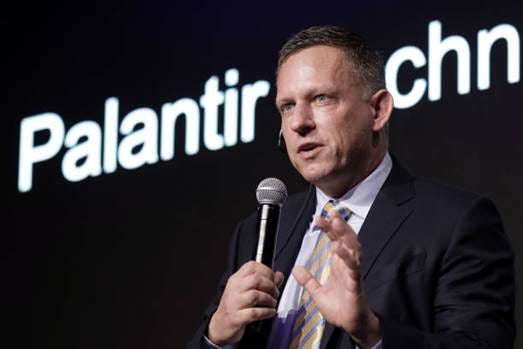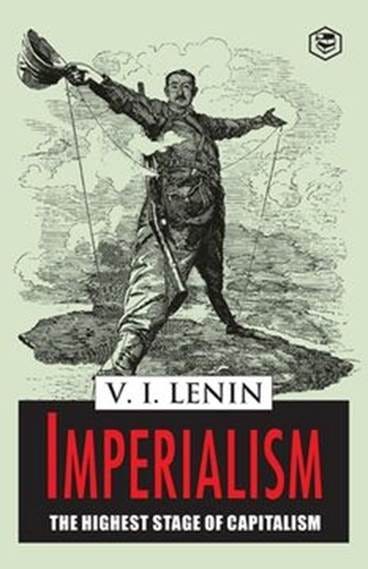Click here for Exit the Cuckoo's Nest's posting standards and aims.
Source: Hua's Substack
Peter Thiele and Vladimir Ilyich Lenin – Apostles of Two Economic Orders (Part 1)
Understanding the US and the Chinese economies from historical lens
Peter Thiele is a self-claimed “libertarian” billionaire with a legendary tech career in the Silicon Valley.
Thiele wears many hats as “the godfather of the PayPal Mafia”, angel investor in Facebook, creator of Palantir which many call the “most evil company in the US”, and former boss and financial sponsor of Vice President JD Vance.
Thiele also has a wide range of unconventional beliefs and has inspired some troubling (to put it mildly) followings such as Dark Enlightenment and Accelerationism.
If his visions are fulfilled, people in the west would be living in a functional “techno feudalism”, a term coined by former Greek finance minister Yanis Varoufakis, where the owners/capitalists and workers have the same relationship as feudal landlords and their sharecroppers. But this is the topic for another article.
Vladimir Lenin was a Russian revolutionary, the founder of the USSR, a brilliant political economist, and author of many books. He led land reforms in the Soviet Union, decolonized non-Russian states by giving them independent status, and promoted labor rights as well as increased access to education.
Though critical of the Soviet form of government, Albert Einstein spoke of Lenin, "I honor Lenin as a man who completely sacrificed himself and devoted all his energy to the realization of social justice”.
Why am I mentioning such two completely different characters in the same breath? How do they shed light on the divergent economic models of China and the US, as I wrote in the subtitle?
I am triggered to write this essay after re-reading Lenin’s 1917 booklet Imperialism, the Highest Stage of Capitalism (which I first read in college 30+ years ago as part of the Economic Dialectical Materialism course) and Thiele’s 2014 op-ed on the Wall Street Journal titled Competition is for Losers (a concept I first read in Thiele’s book Zero to One: Notes on Startups and How to Build the Future).
This time, I managed to connect the dots and find the two authors’ views presciently illuminating to understand the contrast and conflict of the economic systems of the US vs. China – the fundamental fracture behind the geopolitical and geoeconomic rivalry in the new Cold War.
Let’s start with Peter Thiele’s thesis first. Thiele wrote in his Competition is for losers article, “Capitalism and competition are opposite. Capitalism is premised on the accumulation of capital, but under perfect competition, all profits get competed away”.
He argued the “free enterprise” system and entrepreneurs are driven by the profit motive and the goal of any business should be to achieve monopoly in the marketplace so they can reap extraordinary profits. The fiduciary responsibility of founders and managers is shareholder value maximization.
(https://www.wsj.com/articles/peter-thiel-competition-is-for-losers-1410535536)
Thiele was not merely a theoretician of financialized shareholder capitalism, he dedicated his vast resources to identify and invest in such monopolistic businesses from PayPal, Facebook, LinkedIn, YouTube, Space X, to OpenAI.
Interestingly, Sam Altman, the current CEO of OpenAI, hosted Thiele in a Stanford University lecture called How to Start a Startup back in 2015, when Altman was the president of a venture capital firm called Y Combinator.
The central advice from Thiele to his audience was how to achieve monopoly in the businesses they are building. No doubt Altman took it in his heart and is fully dedicated to the holy path of an AI monopoly.
Superficially, Peter Thiele’s thesis seems revolutionary, even controversial, in the US economic system that outwardly prizes “free market competition”. At a deeper level, you will find Thiele’s ideals are exactly the reality of the US economy today –
- Each one of the Mag Seven superstar tech giants in the US is a functional monopoly in their respective industries such as Apple in smart phone, Google in online search, or Nvidia in AI chips
- According to the AI agent Gemini, “the Magnificent Seven companies collectively represent approximately 30-35% of the S&P 500's total market capitalization”, “in 2023, they accounted for 63% of the S&P 500's positive performance. For example, S&P 500 earnings growth would have been negative in 2023 if the Magnificent Seven's results were excluded”. We can safely assume the numbers are even higher today.
- In the military industrial complex, “the top five US defense companies control around 54% of the private market share for the US Pentagon budget, a percentage that has steadily increased over the decades. This dominance highlights the concentration of defense spending among a few large contractors, often referred to as the "Big Five",” according to Gemini.
- In housing, US Congressman Pat Ryan stated in August 2024 that the top private equity firms owned more than 500,000 homes across the US. This number is expected to grow, with private equity firms aiming to control 40% of the single-family rental market by 2030
- “Winner takes all” is the design feature of the US capitalist system for every industry. These oligarchic “winners” will further reinforce their dominance through political capture of the government and the regulators. Anti-trust agencies such as FTC exist only in name today and are toothless against mega corporations and their armies of lobbyists and lawyers
- The much-touted “free enterprise system”, as Lewis Powell described in his now infamous 1971 Powell Memo that launched the US corporate counterrevolution and changed the country’s political economic trajectory, is now a financialized rentier system like a parasite on both the US and the world
Peter Thiele is the perfect embodiment of the system and, fittingly, its most eloquent spokesperson, and now paymaster behind the scenes.
Next, let’s take a look at Lenin’s thoughts in the book Imperialism, the Highest Stage of Capitalism. Vladimir Lenin argues that imperialism is not merely a policy choice of capitalist nations but a necessary and inevitable stage of capitalist development.
Lenin named the following defining features of the imperial form of capitalism (others call late-stage capitalism):
- Transformation from free competition to monopoly capitalism
The central thesis is that "free competition" in the earlier stage of capitalism inevitably leads to the concentration of production and capital into massive, dominant firms, or monopolies. As these monopolies grow and eliminate smaller competitors, they come to dominate entire industries, both domestically and internationally. This shift from competition to monopoly is the fundamental economic characteristic of imperialism.
- Rise of finance capital and financial oligarchy
As production becomes concentrated in monopolies, so does capital. Banks, which initially served as mere intermediaries for credit, become powerful monopolies themselves. They merge with industrial capital, creating what Lenin calls "finance capital." This new form of capital is controlled by a "financial oligarchy"—a small group of extremely powerful bankers and industrialists who exert immense control over the economy and government.
- Export of capital
In the earlier, competitive stage of capitalism, the typical pattern was the export of goods. However, with the dominance of finance capital, the export of capital becomes the defining feature of the imperialist stage.
Monopolies in developed countries accumulate a surplus of capital that can no longer be profitably invested at home. This surplus is then exported to less developed countries where profits are higher due to cheaper land, labor, and raw materials. This capital must be protected by military power.
- Imperialism as the cause of war
The concept of economic monopoly extends into the political sphere. Monopolistic capitalists seek geopolitical hegemony (for example, the contest between the US and China today – this author’s comment). Such a pursuit of hegemony makes war an inevitable outcome of imperialistic capitalism
When you apply Lenin’s analytical framework to today’s west, particularly the US-led Anglo sphere, you can see perfectly how Lenin’s imperial capitalism is the cause of the realities of western economies today –
Deindustrialization
This has been a defining feature of most Western economies since the 1970s. While some of this is a natural consequence of economic development (as services become more important), a significant portion has been driven by the globalization of supply chains and the outsourcing of manufacturing to countries with cheaper labor, like China and Mexico.
This shift has led to job losses in traditional manufacturing hubs and a profound transformation of the labor market, further weakening the bargaining position of domestic working class.
Financialization
Probably the most critical aspect of the modern western economy, financialization heralds a process by which financial markets, financial institutions, and financial motives gain a disproportionate influence over the economy.
It's a shift from an economy focused on producing tangible goods, what Beijing calls the “real economy”, to one where profit is increasingly derived from financial activities.
This includes not just disproportionate growth of the FIRE sector (finance, insurance, real estate), but also the so-called “shareholder value orientation” when non-financial firms prioritize short-term stock price and shareholder returns over long-term investment, R&D, and employee welfare.
Financialization extends to household debt explosion when the population increasingly relies on credit (mortgage, student loan, car loan, credit card) to maintain their standard of living, as wages stagnate.
I wrote a critique of the Chicago school of economics led by Milton Friedman that has provided the main intellectual justification for financial capitalism. https://huabinoliver.substack.com/p/has-the-university-of-chicago-ruined
Rentier Elite Control
The rentier class goes hand in hand with financialization. A rentier derives income from the ownership of assets rather than from productive labor. This "rent" can come from various sources:
Intellectual property: income from patents, copyrights, and brand ownership
Real estate
Financial assets: income from interest, dividends, and capital gains
Instead of competing through innovation, a rentier elite profits by controlling scarce assets and extracting "rents" from others. Today, pharmaceutical companies use patents to charge exorbitant prices for drugs; Apple or Google use their market dominance over iOS and Android to extract fees from app developers.
Rent-seeking is the privilege of monopolies and every large market-cap company in the US today is a rentier business in one way or another, whether it is the tech Mag 7, the defense Big 5, or the top pharmaceutical or retail businesses.
This model of wealth accumulation, based on ownership rather than production, contributes to extreme wealth inequality and stifles economic dynamism.
This concentration of wealth and political influence in the hands of a small financial and rentier elite allows them to shape government policy to their benefit, further entrenching their power.
When we zoom out, we can see clearly the US national strategy is an extension of the monopoly capitalism pursued by its corporate elite. The pursuit of US unipolarity and global hegemony is, in essence, monopoly in geopolitics. By definition, the US at this point is a reactionary imperialist power.
Lenin’s analysis, made in the “pre-modern” 1917, has stood the test of time and proved prescient in predicting the economic and political trajectory of capitalism as practiced in the US.
In the next part, I’ll use Peter Thiele and Vladimir Lenin’s frameworks to argue China is building an Economy of Abundance for Common Prosperity while the US pursues an Economy of Scarcity for the enrichment of the 1%.
The diagonally opposite choices the two countries have made will define what the future of our world looks like.


No comments:
Post a Comment